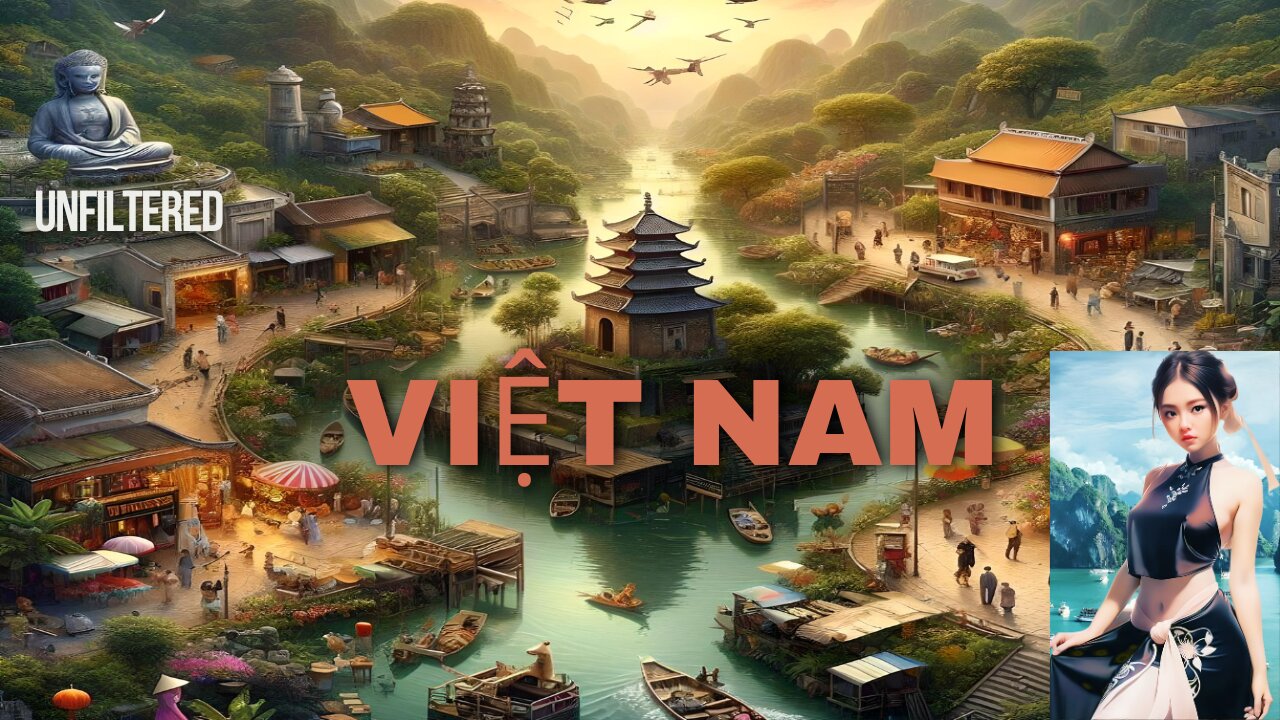Premium Only Content

Country with no Legal Drinking Age I Vietnam
Vietnamese culture is rich and diverse, shaped by the country's long history, its indigenous roots, and the influence of various foreign powers. Here is a brief overview of Vietnam's culture and history:
History:
Ancient Vietnam: The history of Vietnam dates back thousands of years, with evidence of ancient civilizations in the Red River Delta. The Hong Bang Dynasty, said to be the first Vietnamese state, emerged around 2879 BCE.
Chinese Influence: Vietnam experienced a significant period of Chinese domination from 111 BCE to 938 CE. Despite the political control, the Vietnamese managed to preserve their cultural identity, incorporating elements of Chinese culture into their own.
Independence: In 938 CE, the Vietnamese successfully gained independence from Chinese rule under the leadership of Ngo Quyen. This marked the beginning of the age of Vietnamese dynasties.
Dynastic Periods: Vietnam went through various dynastic periods, such as the Ly, Tran, and Le dynasties. The country faced external threats, including Mongol invasions in the 13th century.
Colonial Era: The French colonization of Vietnam began in the mid-19th century. This period of foreign rule led to significant social and economic changes and sparked nationalist movements, culminating in the First Indochina War.
Vietnam War: The Vietnam War (1955-1975) was a pivotal moment in Vietnam's history. The country became divided between North and South Vietnam, with the North led by the communists under Ho Chi Minh. The war ended with the fall of Saigon in 1975 and the reunification of North and South Vietnam.
Modern Vietnam: Since the reunification, Vietnam has undergone economic reforms (Đổi Mới) that have transformed it into one of the fastest-growing economies in Southeast Asia. The government remains a one-party socialist republic.
Culture:
Language: The official language is Vietnamese, a tonal language with a unique script called Chu Nom. The Latin-based script, Quoc Ngu, is widely used.
Religion: The predominant religions in Vietnam are Buddhism, Confucianism, and Taoism. There is also a significant Catholic community, particularly in the south.
Cuisine: Vietnamese cuisine is known for its fresh ingredients, balanced flavors, and use of herbs. Pho (noodle soup), spring rolls, and banh mi (baguette sandwiches) are popular dishes.
Traditional Clothing: The traditional dress for women is the ao dai, a long, elegant tunic worn over trousers. Men often wear simpler versions of the ao dai.
Festivals: Tet Nguyen Dan, or Tet, is the Vietnamese New Year and the most important traditional festival. Other festivals celebrate historical or cultural events, often featuring colorful parades, traditional performances, and fireworks.
Arts and Literature: Vietnam has a rich tradition of poetry, literature, and art. Water puppetry, traditional music, and calligraphy are important cultural expressions.
Family Values: Family holds great significance in Vietnamese culture. Respect for elders, filial piety, and a strong sense of community are integral to their social fabric.
Vietnam's culture and history are a dynamic blend of ancient traditions and modern influences, reflecting the resilience and adaptability of its people.
-
 37:24
37:24
MichaelBisping
21 hours agoEDDIE ALVAREZ: Predicts Islam vs Arman, BKFC KnuckleMania, UFC 311 & More! (Interview)
30.7K6 -
 22:04
22:04
Scammer Payback
15 hours agoCrazy Scammers Spoof Emergency 911
50.7K11 -
 8:28
8:28
Misha Petrov
20 hours agoLiberals OUTRAGED Over Carrie Underwood Performing at Trump’s Inauguration
33.1K37 -
 22:34
22:34
Degenerate Plays
22 hours ago $2.37 earnedWe're Having Bedroom Problems... Literally - Five Nights At Freddy's 4 : Part 5
19.1K -
 1:00:10
1:00:10
Trumpet Daily
21 hours ago $6.32 earnedThe War to Restore America - Trumpet Daily | Jan. 14, 2025
20K15 -
 36:30
36:30
PMG
11 hours ago"Hannah Faulkner and Terrance Williams | DEI IS KILLING AMERICANS"
335 -
 2:51:47
2:51:47
Price of Reason
16 hours agoJimmy Kimmel ATTACKS Trump and PROTECTS Gavin Newsom! Skeleton Crew Finale REVIEW! Ubisoft DEI Woes!
42.5K24 -
 5:14:42
5:14:42
JdaDelete
1 day ago $23.62 earnedThe Legend of Zelda: Skyward Sword HD | With SirPoopsMagee | Part 4
101K13 -
 4:56:18
4:56:18
Sgt Wilky Plays
13 hours agoTesting New setup and Chillin
86.4K5 -
 53:37
53:37
barstoolsports
19 hours agoOne Text Changes The Game | Surviving Barstool S4 Ep13
99.6K7